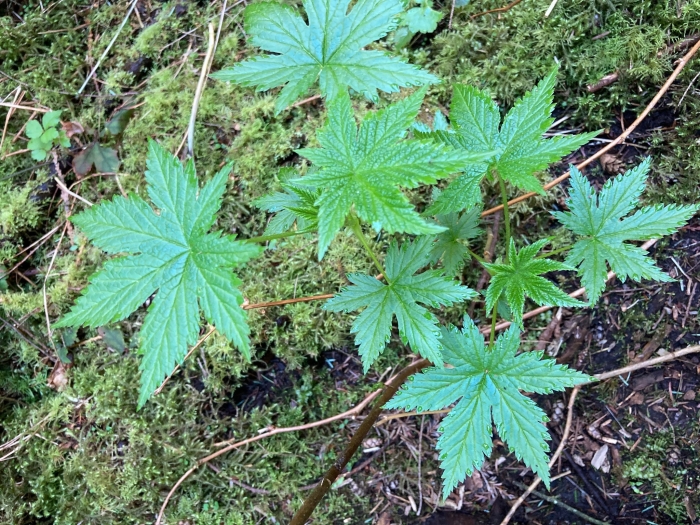Stink Currant
(Ribes bracteosum)
Stink Currant (Ribes bracteosum)
/
/

Maddie Edmonds
CC BY 4.0
Image By:
Maddie Edmonds
Recorded By:
Copyright:
CC BY 4.0
Copyright Notice:
Photo by: Maddie Edmonds | License Type: CC BY 4.0 | License URL: http://creativecommons.org/licenses/by/4.0/ | Rights Holder: Maddie Edmonds | Publisher: iNaturalist | Date Created: 2021-04-18T10:33:29-07:00 |























Estimated Native Range
Summary
Ribes bracteosum, commonly known as Stink Currant, is a deciduous shrub native to the moist, forested regions of western coastal North America, ranging from southeastern Alaska to Mendocino County in California. It typically grows up to 10 feet tall and wide, with a sprawling habit. The leaves are palmately lobed, resembling those of maple trees, and emit a strong odor when crushed, hence the common name. In spring, it produces racemes of small, white or greenish-tinged flowers that are not particularly showy but are attractive to pollinators. Following the flowering season, the shrub bears dark blue, edible fruit that can have an unpleasant taste to some, but are enjoyed by birds and wildlife.
Stink Currant is valued for its ability to thrive in moist, shady conditions, making it suitable for naturalizing in woodland gardens, stream banks, and riparian zones. It is also used for erosion control due to its spreading nature. Gardeners appreciate its low maintenance requirements, as it tolerates a range of soil types, provided they are well-drained, and it requires only moderate watering once established. While it prefers partial to full shade, it can tolerate some sun in cooler climates. There are no major disease or pest issues, but the plant can spread aggressively in favorable conditions, which should be considered when planting.CC BY-SA 4.0
Stink Currant is valued for its ability to thrive in moist, shady conditions, making it suitable for naturalizing in woodland gardens, stream banks, and riparian zones. It is also used for erosion control due to its spreading nature. Gardeners appreciate its low maintenance requirements, as it tolerates a range of soil types, provided they are well-drained, and it requires only moderate watering once established. While it prefers partial to full shade, it can tolerate some sun in cooler climates. There are no major disease or pest issues, but the plant can spread aggressively in favorable conditions, which should be considered when planting.CC BY-SA 4.0
Plant Description
- Plant Type: Shrub
- Height: 6-8 feet
- Width: 6-9 feet
- Growth Rate: Moderate
- Flower Color: Brown, Cream, Green
- Flowering Season: Spring
- Leaf Retention: Deciduous
Growth Requirements
- Sun: Full Sun, Part Shade
- Water: Medium
- Drainage: Medium
Common Uses
Bird Garden, Deer Resistant, Low Maintenance, Showy Flowers
Natural Habitat
Moist, forested regions of western coastal North America, including stream banks and riparian zones
Other Names
Common Names: Stink Currant, Coast Black Gooseberry, Blue Currant, Stinking Currant
Scientific Names: , Ribes bracteosum, Ribes bracteosum var. fuscescens, Ribes bracteosum var. viridiflorum,
GBIF Accepted Name: